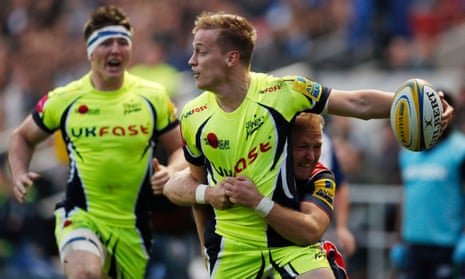Welcome to the month of November when half the world’s planes seem to be stuffed with rugby players. Most have no choice if they wish to pursue their chosen trade. Ireland and New Zealand are in Chicago this week while Australia and South Africa are in London. Fiji are training in Toulouse, with England opting for a short warm-weather break in Portugal. There are almost as many gumshields passing through departure lounges as giant Toblerones.
There is good reason for this hyperactivity. The game is increasingly global and spreading the gospel can be lucrative. The All Blacks are not in the States purely for the fresh Illinois air and Argentina did not stage their Rugby Championship Test against Australia at Twickenham last month because of the local tango-dancing scene. Beyond the financial inducements, though, there are additional benefits: a change of scene can eradicate staleness and complacency and create unexpected new friendships.
Last season’s Top 14 final in Barcelona was a case in point. It was shifted to Catalonia only because French stadiums were being used for the European football championship but the staggering attendance and vivid atmosphere made every continental administrator sit up and take notice. Spain also performed creditably at the Olympic sevens tournament in Rio: could there be a whole new Iberian audience out there waiting to be enticed, if only occasionally, from their round-ball obsession?
Which brings us back, not for the first time, to the Rugby Football Union’s narrower horizons. Bumping into English squad players on red-eye flights to a Portugal training camp on Monday morning was a culture shock simply because it happens so rarely. Aside from one short hop across the Irish Sea to Dublin next March, this is the only time the majority of England’s senior squad will have to board a flight on international business between now and next June. With just about everything the RFU organises occurring in the home counties, a valid driving licence and an Oyster card are pretty much the only requirements.
Once again all four internationals in this autumn’s Old Mutual Wealth series will take place at Twickenham on successive Saturdays. Only a few hundred unsold tickets remain so, financially, the schedule stacks up nicely. Four 80,000-plus attendances, in addition to all the associated corporate hospitality benefits and huge bar profits, will clearly swell the coffers more than taking the odd home Test fixture out on the road.
But hang on. This is a union which has just posted revenues of £407.1m, with record profits for rugby investment of £102.3m. Admittedly a large chunk of that was a consequence of staging the 2015 World Cup but the RFU is far wealthier than any other union. Where it has been less obviously successful is in raising the profile of rugby union in the north of England, a recurring issue that does little to promote the 15-a-side code as a truly national sport.
It can be easy, and somewhat misleading, to dismiss English rugby league as a game played in just a few northern counties. But what about the latest England senior rugby union team? Before Josh Beaumont was called in as an injury replacement, only one member of the 33-strong training squad currently plays for a northern club. Sale’s Mike Haley is that rarest of comets, a northern resident who has caught Twickenham’s attention. None of the other 32 live north of Leicestershire. Before last autumn’s dead rubber against Uruguay, England had hosted one full international in Manchester since 1897.
With Ian Ritchie as chief executive and another northerner, Andy Cosslett, recently sworn in as the RFU’s new chairman, it is not as if there is a lack of appreciation inside Twickenham that the world does not stop at Watford Gap services. When the Guardian made discreet inquiries last week it was told there remains a continuing desire for representative teams to play at northern venues but, crucially, not the senior XV.
It is not good enough. Where would English football be without strong northern clubs? How insular would English cricket look if it did not stage a single Test or one-day international north of the River Trent? How does English rugby union plan to enthuse youngsters and their families from Lancashire, Yorkshire and Cumbria if it gives league a largely unopposed head start? Is it entirely a coincidence that northern lads – Chris Ashton, Sam Burgess, David Strettle – seem increasingly more comfortable with the idea of playing abroad than sticking around in English union. Or that the two main northern cogs in England’s backline – Owen Farrell and George Ford – gravitated towards union largely because their fathers took coaching jobs down south? Tommy Taylor and Danny Care bring the total number of northern-born players currently in Portugal to a measly half dozen.
Maybe it is idealistic to think that playing a Test match against Fiji – or Australia come to that – in Leeds or Manchester would directly assist England in winning the 2023 and 2027 World Cups. Maybe the RFU’s profits would be affected. Maybe it would be less convenient for Eddie Jones to train his players beside the seaside in Blackpool or Bridlington than in Brighton or Brown’s sporting academy in Portugal. But New Zealand train and play at venues all around their country and it does not hinder their national team – the opposite, in fact. Sticking to convention and doing what you always do is no way to run or grow a sport, let alone deliver a truly national side. England do not even have to board a plane to locate fresh new frontiers.
Get shirty
The 2017 British and Irish Lions jersey is being unveiled this week, still a must-have garment for all professional players in the four home unions. Not every strip seen this season falls into that category: will many players reminisce nostalgically about the days they wore the dull grey away strip of Bath or the hi-vis green stewards’ outfits currently sported by Leicester on their travels? Or those shorts with a sponsor’s name plastered across the players’ backsides? It was a marketing wheeze but New Zealand’s deliberately blacker-than-black kit – with accompanying socks and dark boots to match – was at least more visually striking and aesthetically appealing. Compare and contrast with the latest blue change kit set to be worn by England against Fiji a fortnight on Saturday. Both are manufactured by Canterbury but only one will stand the test of time.
And another thing …
Congratulations are due to Zebre for achieving their first victory in six attempts in this season’s Pro12 last Friday night in Edinburgh. It is not always easy to discern shafts of optimism in Italian provincial rugby and this year’s European Champions’ Cup results to date have been grim. Good luck, then, to Conor O’Shea, Italy’s new national coach, and his assistant Mike Catt as they prepare to face New Zealand, South Africa and Tonga in their first home Tests in charge of the Azzurri. If the Italian patient can be resuscitated on their watch, it will be a colossal achievement worthy of worldwide acclaim.

